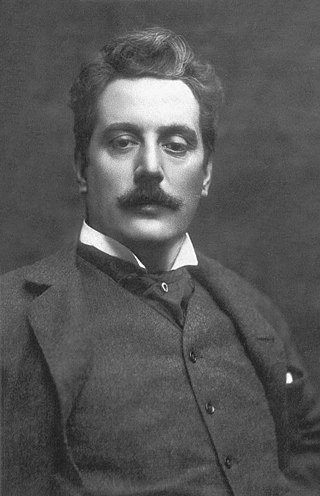Related Research Articles

Giacomo Puccini was an Italian composer known primarily for his operas. Regarded as the greatest and most successful proponent of Italian opera after Verdi, he was descended from a long line of composers, stemming from the late Baroque era. Though his early work was firmly rooted in traditional late-nineteenth-century Romantic Italian opera, it later developed in the realistic verismo style, of which he became one of the leading exponents.

Gerald Sheldon Herman was an American composer and lyricist, known for his work in Broadway theatre.

William Howard Schuman was an American composer and arts administrator.

Marvin Frederick Hamlisch was an American composer and conductor. He is one of a handful of people to win Emmy, Grammy, Oscar and Tony awards, a feat dubbed the "EGOT". He and composer Richard Rodgers are the only people to have won those prizes and a Pulitzer Prize ("PEGOT").

Harold Victor Bauer was an English-born pianist of Jewish heritage who began his musical career as a violinist.

The Opéra-Comique is a Paris opera company which was founded around 1714 by some of the popular theatres of the Parisian fairs. In 1762 the company was merged with – and for a time took the name of – its chief rival, the Comédie-Italienne at the Hôtel de Bourgogne. It was also called the Théâtre-Italien up to about 1793, when it again became most commonly known as the Opéra-Comique. Today the company's official name is Théâtre national de l'Opéra-Comique, and its theatre, with a capacity of around 1,248 seats, sometimes referred to as the Salle Favart, is located at Place Boïeldieu in the 2nd arrondissement of Paris, not far from the Palais Garnier, one of the theatres of the Paris Opéra. The musicians and others associated with the Opéra-Comique have made important contributions to operatic history and tradition in France and to French opera. Its current mission is to reconnect with its history and discover its unique repertoire to ensure production and dissemination of operas for the wider public. Mainstays of the repertory at the Opéra-Comique during its history have included the following works which have each been performed more than 1,000 times by the company: Cavalleria Rusticana, Le chalet, La dame blanche, Le domino noir, La fille du régiment, Lakmé, Manon, Mignon, Les noces de Jeannette, Le pré aux clercs, Tosca, La bohème, Werther and Carmen, the last having been performed more than 2,500 times.

Charles Strouse is an American composer and lyricist best known for writing the music to such Broadway musicals as Bye Bye Birdie, Applause, and Annie.

Dominick Argento was an American composer known for his lyric operatic and choral music. Among his best known pieces are the operas Postcard from Morocco, Miss Havisham's Fire, The Masque of Angels, and The Aspern Papers. He also is known for the song cycles Six Elizabethan Songs and From the Diary of Virginia Woolf; the latter earned him the Pulitzer Prize for Music in 1975. In a predominantly tonal context, his music freely combines tonality, atonality and a lyrical use of twelve-tone writing. None of Argento's music approaches the experimental, stringent avant-garde fashions of the post-World War II era.

Ignaz Brüll was a Moravian-born pianist and composer who lived and worked in Vienna.
Jerome Moross was an American composer best known for his music for film and television. He also composed works for symphony orchestras, chamber ensembles, soloists and musical theater, as well as orchestrating scores for other composers.
Musical nationalism refers to the use of musical ideas or motifs that are identified with a specific country, region, or ethnicity, such as folk tunes and melodies, rhythms, and harmonies inspired by them.
Frederick Emil Ahlert was an American composer and songwriter.

Eric Salzman was an American composer, scholar, author, impresario, music critic, and record producer. He is best known for his contributions to 'New Music Theater,' a concept he advanced through both his compositions and writings. He established it as an independent art form, distinct from grand opera and popular musicals, both aesthetically and economically. He co-founded the American Music Theater Festival and was, at the time of his death in 2017, Composer-in-Residence at the Center for Contemporary Opera.
Joseph Wilfred Kerman was an American musicologist and music critic. Among the leading musicologists of his generation, his 1985 book Contemplating Music: Challenges to Musicology was described by Philip Brett in The Grove Dictionary of Music and Musicians as "a defining moment in the field". He was Professor Emeritus of Musicology at the University of California, Berkeley.

François-Henri-Joseph Blaze, known as Castil-Blaze, was a French musicologist, music critic, composer, and music editor.

John Joseph Braham was an English-born American musical theater conductor and composer who introduced the works of Gilbert and Sullivan to the United States and composed some of the earliest original orchestral scores for silent film.

Eric Walter Blom was a Swiss-born British-naturalised music lexicographer, music critic and writer. He is best known as the editor of the 5th edition of Grove's Dictionary of Music and Musicians (1954).
Arthur David Jacobs was an English musicologist, music critic, teacher, librettist and translator. Among his many books, two of the best known are his Penguin Dictionary of Music, which was reprinted in several editions between 1958 and 1996, and his biography of Arthur Sullivan, which was praised by critics in Britain and America. He was a music critic at newspapers from 1947 to 1975, an editor at Opera magazine from 1961 to 1971, and served on Opera's editorial board from 1971 until his death. He was also a frequent contributor to The Musical Times for five decades. Jacobs taught at the Royal Academy of Music, at Huddersfield Polytechnic, and at universities in the US, Canada, and Australia from 1964 to 1985 and translated more than 20 operas into English.

Alfred Baldwin Sloane, often given as A. Baldwin Sloane, was the most prolific songwriter for Broadway musical comedies in the United States at the beginning of the 20th century. Despite his output and success during his lifetime, none of his music has had enduring popularity. Two of his most popular songs were "When You Ain't Got No Money You Needn't Come Around" and "Coming Through the Rye". His most successful hit tune was “Heaven Will Protect the Working Girl" which was first performed by Marie Dressler in the 1910 show Tillie's Nightmare.
Stephen Hinton is a British-American musicologist at Stanford University. A leading authority on the composer Kurt Weill, he has published widely on many aspects of modern German music history, with contributions to publications such as Handwörterbuch der musikalischen Terminologie, The New Grove Dictionary of Opera, The New Grove Dictionary of Music and Musicians, Die Musik in Geschichte und Gegenwart, and Funkkolleg Musikgeschichte. His most recent book, Weill's Musical Theater: Stages of Reform, the first musicological study of Weill's complete stage works, received the 2013 Kurt Weill Book Prize for outstanding scholarship in music theater since 1900. The reviewer for the Journal of the American Musicological Society described the book as "a landmark in the literature on twentieth-century musical theater."